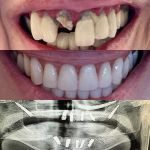- 1-Daily-Oral-Hygiene-Routine
- 2-Importance-of-Regular-Dental-Checkups
- 3-Nutrition-and-Its-Impact-on-Teeth-and-Gums
- 4-Avoiding-Harmful-Habits-for-Healthy-Teeth-and-Gums
- 5-Natural-Remedies-and-Supportive-Practices
- 6-When-to-See-a-Dentist
1. Daily Oral Hygiene Routine for Healthy Teeth and Gums
Maintaining a consistent daily oral hygiene routine is the cornerstone of healthy teeth and gums. Brushing your teeth at least twice a day with fluoride toothpaste removes plaque and food particles that cause tooth decay and gum disease. Using a soft-bristled toothbrush and replacing it every three months ensures effective cleaning without damaging delicate gum tissue.
Flossing daily is equally important as it cleans areas between teeth where a toothbrush cannot reach. Many people overlook flossing, but it plays a critical role in preventing gum inflammation and cavities. Additionally, rinsing with an antiseptic mouthwash can reduce bacteria and freshen breath.
Studies show that people who consistently follow these habits have a significantly lower risk of developing gingivitis and cavities. For example, a case from Dentistry Toothtruth revealed how a patient reversed early gum disease through disciplined daily care.
1.1 Proper Brushing Techniques
Brushing should be done gently at a 45-degree angle to the gums, using short strokes. Avoid aggressive scrubbing, which can erode enamel and cause gum recession. Taking at least two minutes to brush ensures thorough cleaning of all tooth surfaces.
2. Importance of Regular Dental Checkups
Even the best oral hygiene routine cannot replace professional dental care. Scheduling regular dental checkups every six months allows dentists to detect early signs of decay, gum disease, or other oral health issues. Professional cleanings remove tartar buildup that brushing and flossing alone cannot address.
During these visits, dentists also provide personalized advice based on your oral health status. For instance, patients with a history of gum disease might need more frequent cleanings and specialized treatments. Regular checkups have been linked to lower rates of tooth loss and improved long-term oral health outcomes.
According to a recent survey by Dentistry Toothtruth, patients who attended biannual visits reported better gum health and fewer cavities compared to those who skipped appointments.
2.1 Early Detection Saves Teeth
Timely identification of problems like cavities or periodontitis allows for less invasive and more affordable treatments. Waiting too long can lead to tooth extraction or complex procedures.
3. Nutrition and Its Impact on Teeth and Gums
What you eat has a profound effect on your dental health. Diets rich in sugars and acidic foods contribute to enamel erosion and cavity formation. Conversely, consuming calcium-rich foods such as dairy products strengthens tooth enamel and supports bone health.
Vitamins C and D also play essential roles; vitamin C helps maintain gum tissue integrity, while vitamin D enhances calcium absorption. Incorporating fresh fruits, vegetables, nuts, and lean proteins supports overall oral health and helps reduce inflammation.
For example, a nutrition plan shared by a dental patient on Dentistry Toothtruth emphasized reducing sugary snacks and including more leafy greens, which led to notable improvements in gum health within months.
3.1 Hydration and Saliva Production
Drinking plenty of water helps rinse away food particles and stimulates saliva, a natural defense against tooth decay. Avoiding excessive caffeine and alcohol supports saliva flow and gum health.
4. Avoiding Harmful Habits for Healthy Teeth and Gums
Several common habits can undermine your efforts to maintain healthy teeth and gums. Smoking, for instance, drastically increases the risk of gum disease and oral cancer. Tobacco use reduces blood flow to the gums, impeding healing and immune response.
Grinding teeth, often caused by stress, leads to enamel wear and jaw pain. Using a mouthguard at night can protect teeth from damage. Excessive consumption of sugary drinks and acidic sodas also accelerates enamel erosion.
Dental professionals at Dentistry Toothtruth emphasize the importance of quitting smoking and managing stress to protect oral health. Many patients who adopted healthier lifestyles reported less gum bleeding and improved breath freshness.
4.1 The Impact of Stress and Sleep
Stress can impair immune function, making gums more vulnerable to infection. Quality sleep aids tissue repair, including in the mouth. Addressing these factors is often overlooked but vital.
5. Natural Remedies and Supportive Practices
Alongside conventional dental care, some natural remedies can support healthy teeth and gums. Oil pulling with coconut oil, for example, has been shown to reduce harmful bacteria and improve gum health when used consistently.
Herbal mouth rinses containing ingredients like neem or chamomile may soothe inflammation and promote healing. However, these should complement, not replace, regular brushing, flossing, and dental visits.
Case studies shared by Dentistry Toothtruth include patients who used natural adjuncts alongside professional treatment and reported reduced gum sensitivity and better breath control.
5.1 Importance of Consistency
Natural remedies work best with consistent use and as part of a broader oral hygiene plan, rather than quick fixes.
6. When to See a Dentist
Recognizing warning signs early can prevent serious dental problems. Persistent gum bleeding, swelling, bad breath, or tooth pain warrant prompt dental consultation. Delaying care risks progression to advanced gum disease or tooth loss.
Regular visits to your dentist allow monitoring and timely intervention. Dentistry Toothtruth offers professional evaluations and personalized care plans designed to maintain and restore oral health effectively.
Listening to your body and seeking care when symptoms arise is crucial to keeping your teeth and gums healthy long term.







 Farzad Khalili, LD0.0 (0 review)
Farzad Khalili, LD0.0 (0 review) Bruce E Matthews DDS PA4.0 (201 review)
Bruce E Matthews DDS PA4.0 (201 review) Boyles Dental5.0 (474 review)
Boyles Dental5.0 (474 review) Alexia R. Lucero, DDS4.0 (124 review)
Alexia R. Lucero, DDS4.0 (124 review) Orlando Family Dentistry, LLC5.0 (16 review)
Orlando Family Dentistry, LLC5.0 (16 review) Smile Philly! Deepa Patel, D.M.D.4.0 (171 review)
Smile Philly! Deepa Patel, D.M.D.4.0 (171 review) The Importance of Oral Health Education During Pregnancy for a Healthy Pregnancy
The Importance of Oral Health Education During Pregnancy for a Healthy Pregnancy Best Tips for Brushing Your Teeth Properly for Healthy Gums: Essential Techniques for Oral Health
Best Tips for Brushing Your Teeth Properly for Healthy Gums: Essential Techniques for Oral Health Why Skipping Dental Checkups Can Lead to Bigger Oral Health Problems
Why Skipping Dental Checkups Can Lead to Bigger Oral Health Problems Advantages of Porcelain Dental Restorations
Advantages of Porcelain Dental Restorations How Can Diabetes Cause Tooth and Gum Problems? Preventing and Managing Oral Health Issues
How Can Diabetes Cause Tooth and Gum Problems? Preventing and Managing Oral Health Issues Healthy Habits for Promoting Good Oral Health and Hygiene: Tips for a Healthy Smile
Healthy Habits for Promoting Good Oral Health and Hygiene: Tips for a Healthy Smile